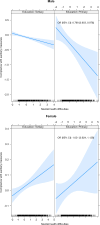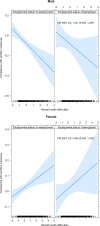Psychological distress and compliance with sanitary measures during the Covid-19 pandemic
- PMID: 40742980
- PMCID: PMC12312964
- DOI: 10.1371/journal.pone.0317272
Psychological distress and compliance with sanitary measures during the Covid-19 pandemic
Abstract
Background: This study aims to understand the relationship between the experience of psychological distress and compliance with COVID-19 sanitary measures. We testeed whether this relationship was modified by individuals' gender and socioeconomic status (i.e., educational level and employment).
Methods: Data from four European cohort studies (n = 13,635), were analysed using an Individual Participant Data (IPD) meta-analytic approach. Mixed effect models were employed to examine associations between mental health difficulties and compliance with sanitary measures, as well as effect modification by socioeconomic status. Statistical models were stratified by gender.
Results: We found a statistically significant association between mental health difficulties and increased compliance with sanitary measures in women, while amongst men the statistically significant association observed was opposite. Moreover, there was a statistically significant interaction between participants' educational level and mental health difficulties amongst men only, indicating especially low compliance levels with COVID-19 sanitary measures amongst individuals with only primary schooling and who reported psychological distress.
Conclusion: The association between psychological distress and compliance with sanitary measures is complex-positive in women, negative in men. Men experiencing mental health difficulties, especially those with lower educational attainment, exhibit low levels of compliance with sanitary measures. These results suggest that psychological distress and its possible consequences should be considered when designing measures addressing infectious disease spread.
Copyright: © 2025 Hecker et al. This is an open access article distributed under the terms of the Creative Commons Attribution License, which permits unrestricted use, distribution, and reproduction in any medium, provided the original author and source are credited.
Conflict of interest statement
none.
Figures



References
MeSH terms
LinkOut - more resources
Full Text Sources
Medical

